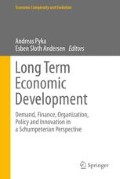Abstract
A system is a set of elements which are connected in particular ways. The formal general equilibrium model is an extreme case in which every element is directly connected to every other and in which all potential external connections, including connections from the future, are incorporated in the data. The foundational assumption of this paper is that viable systems must be selectively connected, and that viable large systems are highly-decomposable assemblies of smaller systems. As Simon argued, quasi-decomposability has made evolution possible from the beginning of the universe. Economies are evolutionary systems, in which human intentionality is a novel feature which modifies but does not supersede the processes of novelty generation, selection and diffusion. The microfoundations for this study are found in the characteristics of the human brain as a system of selective connections. Human knowledge consists of domain-limited patterns imposed on events. Organization—selective connections—is thus basic; but the potential for human knowledge is greatly enhanced by specialisation between domains, combined with variation within each. Co-ordination and development, so often separated in economic theory, are interconnected; they are both ordered processes—not states, in which markets (alongside many other institutions) are prime sources of order.
Reprinted from Evolutionary Economics 22(4), 833–846, Springer (2012)
Access this chapter
Tax calculation will be finalised at checkout
Purchases are for personal use only
References
Atiyah M (2008) Mind, matter and mathematics. Presidential Address to the Royal Society of Edinburgh. (Recording available at royalsoced.org.uk/events)
Barnard CI (1938) The functions of the executive. Harvard University Press, Cambridge
Burns T, Stalker GM (1961) The management of innovation. Tavistock, London
Casson M (1982) The entrepreneur: an economic theory. Edward Elgar, Cheltenham
Chandler AD (1960) Strategy and structure. MIT Press, Cambridge
Coase RH (1937) The nature of the firm. Economica NS 4:386–405. Reprinted in Coase, RH (1988) The firm, the market, and the law. University of Chicago Press, Chicago
Drucker PF (1969) The age of discontinuity. Heinemann, London
Hayek FA (1952) The sensory order. University of Chicago Press, Chicago
Hounshell DA, Smith JK Jr (1988) Science and corporate strategy: Du Pont R & D 1902–1980. Cambridge University Press, Cambridge
Kelly GA (1963) A theory of personality. W. W. Norton, New York
Kirzner IM (1973) Competition and entrepreneurship. University of Chicago Press, Chicago
Knight FH (1921) Risk, uncertainty and profit. Houghton Mifflin, Boston
Marshall A (1919) Industry and trade. Macmillan, London
Marshall A (1920) Principles of economics, 8th edn. Macmillan, London
Penrose ET (1959) The theory of the growth of the firm. Basil Blackwell, Oxford
Popper KR (1972) The logic of scientific discovery, 6th impression. Hutchinson, London
Prigogine I (2005) The rediscovery of value and the opening of economics. In: Dopfer K (ed) The evolutionary foundations of economics. Cambridge University Press, Cambridge, pp 61–69
Raffaelli T (2003) Marshall’s evolutionary economics. Routledge, London
Raffaelli T (2008) The general pattern of Marshallian evolution. In: Shionoya Y, Nishizawa T (eds) Marshall and Schumpeter on evolution: economic sociology of capitalist development. Cheltenham, UK and Northampton, MA, USA, pp 36–47
Richardson GB (1960) Information and investment. Oxford University Press, Oxford
Richardson GB (1972) The organisation of industry. Econ J 82:883–896
Ryle G (1949) The concept of mind. Hutchinson, London
Schumpeter JA (1934) The theory of economic development. Harvard University Press, Cambridge
Simon HA ([1962] 1969) The sciences of the artificial. MIT Press, Cambridge
Smith A ([1759] 1976a) The theory of moral sentiments. In: Raphael DD, Macfie AL (eds) Oxford University Press, Oxford
Smith A ([1776] 1976b) An inquiry into the nature and causes of the wealth of nations. In:Campbell RH, Skinner AS, Todd WB (eds) 2 volumes. Oxford University Press, Oxford
Smith A ([1795] 1980) The principles which lead and direct philosophical enquiries: illustrated by the history of astronomy. In: Wightman WPD (ed) Essays on philosophical subjects. Oxford University Press, Oxford
Young A (1928) Increasing returns and economic progress. Econ J 38:527–542
Ziman JM (1978) Reliable knowledge. Cambridge University Press, Cambridge
Ziman JM (2000) Real science: what it is and what it means. Cambridge University Press, Cambridge
Author information
Authors and Affiliations
Corresponding author
Editor information
Editors and Affiliations
Rights and permissions
Copyright information
© 2013 Springer-Verlag Berlin Heidelberg
About this chapter
Cite this chapter
Loasby, B.J. (2013). Building Systems. In: Pyka, A., Andersen, E. (eds) Long Term Economic Development. Economic Complexity and Evolution. Springer, Berlin, Heidelberg. https://doi.org/10.1007/978-3-642-35125-9_18
Download citation
DOI: https://doi.org/10.1007/978-3-642-35125-9_18
Published:
Publisher Name: Springer, Berlin, Heidelberg
Print ISBN: 978-3-642-35124-2
Online ISBN: 978-3-642-35125-9
eBook Packages: Business and EconomicsEconomics and Finance (R0)

